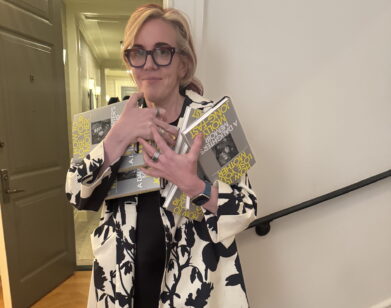Tom Reiss is Down for the Count

ABOVE: TOM REISS
Tom Reiss’s The Black Count (Crown) uncovers the fascinating and forgotten life of General Dumas, father to the novelist Alexandre Dumas. Born on the island of Saint Dominique to a scurrilous French nobleman and a beautiful slave mother, Alex Dumas left his lush tropical youth behind and arrived on France’s shores at 15 to be educated in the ways of the aristocracy. Swordfighting, horseback riding, dancing and wooing damsels became him; and in a unique society where equality and brotherhood were the flags of the Enlightenment, Dumas thrived. He became one of the most heroic generals of the French Revolution, capturing the Alps and fighting alongside Napoleon, the rival who would eventually wrongfully imprison him and endeavor to wipe him out of history.
Although General Dumas died when Alexandre was a boy, his father infused almost all the novelist’s great works and characters, The Three Musketeers and The Count of Monte Cristo. Reiss brings figures out of history as fiery, courageous, and human, expertly sharing historical facts as well as ancient dramas. We spoke with Reiss about the power of remembering, raincoats, vengeance, race and what makes a life worthy of legend.
ROYAL YOUNG: Alexandre Dumas believed the worst sin is forgetting. To remember a person is the most important thing. Why is it so important to remember?
TOM REISS: Remembering people is the most fundamental gesture of love and respect. For me, there are people in my life who are no longer with me, who have died, who are with me as much as any living person because I remember everything about them. My great-uncle, who I got a lot of guidance in life from, meant so much to me. A lot of my interests came out of time I spent with him. The first time I dedicated myself to resurrecting and preserving somebody’s memories was with my great-uncle. I knew he was going to die in the next few years, and I had grown up listening to all his stories about people who had been trapped or chased by the Nazis. I began to record them. The way lives intersect with history has always been my central obsession. And whenever I go on the road to hunt down one of these characters, I wear this very old London Fog raincoat from my great-uncle.
YOUNG: What happens if you live your life trying to forget? What about if you live your life seeking vengeance? How does that affect your life?
REISS: The demons you have are what motivate you to make your art. This is what drives the detective, this is what drives the painter, this is what drives the writer: a conflicting urge to forget pain and at the same time remember it and fight for some kind of justice. I know these powerful things are inside of me and everyone in some way or another.
YOUNG: This is how we make sense of our personal history.
REISS: For me, history is always personal. And it’s how your personal history interacts with the history of your time. I’m very attracted to characters who were cursed, as the Chinese say, to live in interesting times.
YOUNG: Do you feel like in the specifics we discover the universal? By putting a single human face on larger events, we can understand those events more deeply.
REISS: Exactly.
YOUNG: Let’s talk about injustice.
REISS: The life of General Dumas was like an Alexandre Dumas novel. They threw him in the dungeon and then erased any evidence that he was in the dungeon. He disappeared, and even the tragedy of his disappearance was erased. In this book, more than anything else I’ve ever written, the reasons why his life was erased are the key to everything fascinating about him.
YOUNG: What are those reasons?
REISS: From one man’s life, I have been able to pull back from the ashes of history what is the great unknown accomplishment of the French Revolution. The French Revolution created the 21st-century post-racial world 200 years before anyone else did. Dumas, in a funny way, was like Obama. There was certainly no mixed-race leader in a white society that had ever reached that level of power. Dumas was able to do this not only because he was one incredible guy, but this was an incredible moment. Society was suddenly opened to black people, people of mixed race, Jews. It was a very fast thing that happened. The French went almost overnight from being a slave society and totally Catholic to [one where] race, creed or color didn’t matter. It was the American Revolution on steroids.
YOUNG: What fascinated me about the times described in the book was how such extremes existed alongside each other. In Saint Dominique, where General Dumas was born, there was horrific slavery, but at the same time free blacks with tremendous wealth attended operas.
REISS: The French Empire, and France itself, was a country where beauty, immense opportunity, insane ugliness, and betrayal were right up against one another. Slavery became the great Enlightenment metaphor. Rousseau’s opening line for The Social Contract was, “Man is born free, and everywhere he is in chains.” The French had a whole forgotten civil-rights movement. There were renegade French nobles who devoted their lives contemplating human rights. We think of them in their last years partying all the time and being totally decadent, but that wasn’t true at all.
YOUNG: What makes a life worthy of legend?
REISS: Dumas was the guy who defended bridges against 40-odd men armed with only his sword. There were these incredible soldier’s tales about him. But, really what makes him a hero is that he had nothing to lose, yet everything to lose. His father was a high-born white, and his mother was a slave. He embodied the highest and lowest rungs of society. He had this great love for his wife and children. He had everything to get home for, but he embraced his ideals and decided to fight for them. He actually believed in liberty, equality and brotherhood. He risked his life for it and never lets himself be beaten down, but he also never becomes hard.
THE BLACK COUNT IS OUT NOW.






